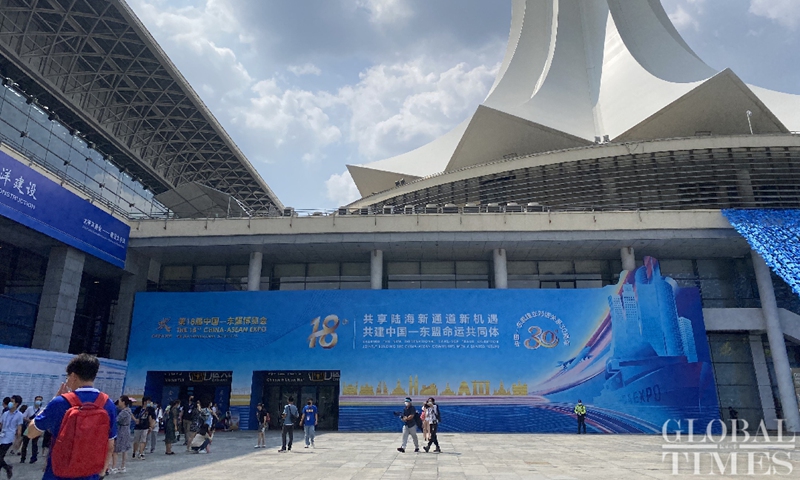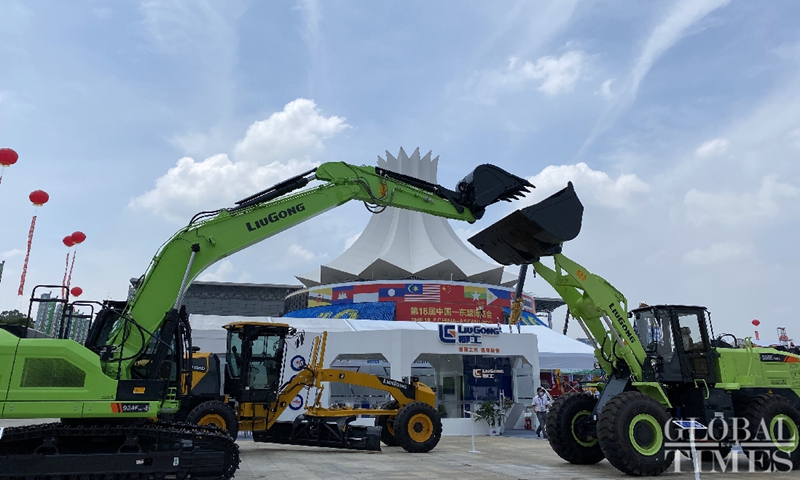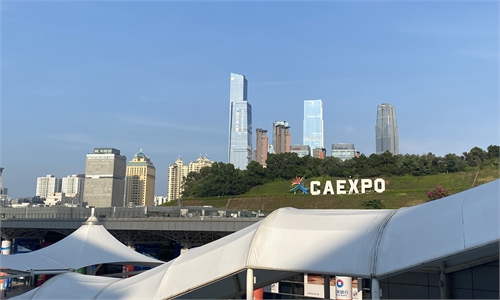
China-ASEAN Expo under the spotlight Photo:Zhang Dan/GT
As the coronavirus and geopolitical factors added increasing uncertainties to global supply and value chains, ambassadors from Southeast Asian countries to China called for stronger trade ties with the world's second largest economy in a bid to speed up the region's economic recovery from the pandemic.
At the 18th China-ASEAN Expo (CAEXPO) and China-ASEAN Business and Investment Summit, which kicked off on Friday in Nanning, Guangxi Zhuang Autonomous Region, the Global Times reporter talked with several ambassadors who agreed that strengthening China-ASEAN cooperation in trade and supply chains have become more necessary than ever before.
At present, ASEAN members play minor roles in industries with high-value. "We look forward to participating in global supply chains and creating opportunities for ASEAN manufacturers so that they can enter global market and expand their market share," Ambassador of Myanmar to China U Myo Thant Pe told press at the expo.
Establishing a new supply and demand relationship and value chain-based trade relations between China and ASEAN will bring benefits for both sides, as China has a big say in industrial relocation and boasts to have one of the most complete industrial production systems, he noted.
Deepening China-ASEAN trade and industrial chain cooperation will surely help deal with the global industrial and supply chain uncertainties as well as cushion coronavirus-induced impacts, the ambassador added.
Trade between China and ASEAN increased from $8.36 billion in 1991 to $685.28 billion in 2020, according to Chinese customs data. Despite the coronavirus wreaking havoc on the world economy in 2020, ASEAN has become China's largest trade partner for the first time.
In the first eight months this year, bilateral trade grew 22.8 percent year-on-year to 3.59 trillion yuan ($560 billion) and accounted for 14.5 percent of China's total foreign trade volume.
Strong and stable political relations underpin robust trade in the region. Lui Tuck Yew, Singapore Ambassador to China, told the Global Times at the expo that the China-Singapore political relationship is strong. "There are regular exchanges. The economic relationship has potential for even greater development and growth in the coming years."
However, challenges and crises still remain as repeated coronavirus outbreaks in various countries in the region rack up costs which hinder factory resumptions, cross-border logistics and free personnel exchanges.

China-ASEAN Expo under the spotlight Photo:Zhang Dan/GT
Today's economic recovery is still fragile so ASEAN members need to remain vigilant, ASEAN Deputy Secretary-General Satvinder Singh warned at the expo.
He praised that the interconnectivity level between China's supply chains and that in all countries along the Belt and Road Initiative has improved greatly in the past decade, and stressed that "ASEAN prioritizes the agenda of connectivity of supply chains at the current stage."
Seeing a greater level of regionalization, Malaysian Ambassador to China Raja Nushirwan Zainal Abidin said today's supply chain in the region is becoming shorter. Citing China importing a great deal of semiconductors from Malaysia, he noted the two countries are part of the same global supply chain in such a high-tech product.
He commended the expo as a good platform for ASEAN countries to learn how to operationalize the very important provisions of the world's largest trade pact RCEP (Regional Comprehensive Economic Partnership).
"The RCEP will come into force. This means lower tariff barriers between countries participating and a greater transparency in the rules and regulations surrounding trade," he told the Global Times on Friday.
During the expo and the summit, Chinese customs together with the government of Guangxi on Saturday published the China-ASEAN Trade Index - a barometer of bilateral trade which would provide reference for government and foreign trade enterprises.
The 2020 index stood at 241.09 points, up 19.64 percent compared with the pre-pandemic level of 2019, and up 141.09 percent compared with 2010, showing bilateral trade has grown steadily and continuously, Chinese customs said.



